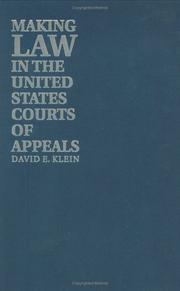| Listing 1 - 2 of 2 |
Sort by
|

ISBN: 110712509X 1280419474 0511177356 0511020988 0511158327 0511304951 0511613709 0511044984 9780511020988 9780511613708 9780511044984 9780511158322 9786610419470 6610419477 052181023X 0521891450 9780521810234 9780521891455 Year: 2002 Publisher: Cambridge, UK ; New York : Cambridge University Press,
Abstract | Keywords | Export | Availability | Bookmark
 Loading...
Loading...Choose an application
- Reference Manager
- EndNote
- RefWorks (Direct export to RefWorks)
The book, first published in 2002, examines circuit court decision making on issues not clearly covered by existing precedents. Its central questions are to what extent circuit judges' choices to adopt legal rules are influenced by the actions of other circuit judges and whether judges attempt to decide legal issues as they think the Supreme Court would in their place. Evidence comes from quantitative analyses of several hundred cases and from interviews with two dozen circuit court judges. The evidence indicates that judges give attention to the work of colleagues on their own court and other circuits and that the actions, prestige, and expertise of these colleagues are important. On the other hand, while Supreme Court precedents factor heavily in the circuit judges' decisions, expectations as to how the Supreme Court might decide appear to have little effect on their actions. These findings suggest that legal and policy goals influence judges' decision-making.
Appellate courts --- Judicial process --- Federal courts --- Social Sciences --- Political Science
Book
ISBN: 0813940354 9780813940359 9780813940342 0813940346 Year: 2017 Publisher: Charlottesville London University of Virginia Press
Abstract | Keywords | Export | Availability | Bookmark
 Loading...
Loading...Choose an application
- Reference Manager
- EndNote
- RefWorks (Direct export to RefWorks)
Once largely ignored, judicial elections in the states have become increasingly controversial over the past two decades. Legal organizations, prominent law professors, and a retired Supreme Court justice have advocated the elimination of elections as a means to choose judges. One of their primary concerns is interest group involvement in elections to state supreme courts, which they see as having negative effects on both the courts themselves and public perceptions of these judicial bodies. In The Battle for the Court, Lawrence Baum, David Klein, and Matthew Streb present a systematic investigation into the effects of interest group involvement in the election of judges. Focusing on personal-injury law, the issue that has played the most substantial role in spurring interest group activity in judicial elections, the authors detail how interest groups mobilize in response to unfavorable rulings by state supreme courts, how their efforts influence the outcomes of supreme court elections, and how those outcomes in turn effectively reshape public policies. The authors employ several decades’ worth of new data on campaign activity, voter behavior, and judicial policy-making in one particularly colorful, important, and representative state—Ohio—to explore these connections among interest groups, elections, and judicial policy in a way that has not been possible until now.
Judges --- Political questions and judicial power --- Alcaldes --- Cadis --- Chief justices --- Chief magistrates --- Justices --- Magistrates --- Courts --- Election. --- Selection and appointment --- Legal status, laws, etc. --- Officials and employees --- Rechters --- Politiek en rechterlijke macht --- Selectie en aanstelling --- Verenigde Staten --- Verkiezingen
| Listing 1 - 2 of 2 |
Sort by
|

 Search
Search Feedback
Feedback About UniCat
About UniCat  Help
Help News
News